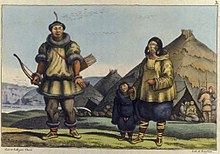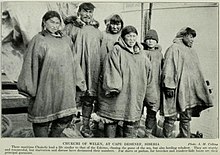Chukchi


The Chukchi (also Luoravetlanen , from the self-name ļyg'orawetļ'an [ ˈɬəɣʔɔˈrawɛˌtɬʔan ], German "real people" from ļygi "real" and 'orawetļ'an "human", Russian Чукча " Chukcha ") belong to the indigenous population Peoples of the Russian Far East .
The majority of them live in the Chukchi Autonomous Okrug on the Chukchi Peninsula . However, some also live in neighboring areas.
Language, culture and religion
There are around 15,000 Chukchi in total. Of these, around 10,000 speak the Chukchi language , a paleo-Siberian language . The only known German word from the Chukchi language is the name for a type of salmon (Chukchi. Qetaqet ) called Ketalachs (German also dog salmon , Latin Oncorhynchus keta ), from which the keta caviar is obtained.
Traditionally, the inland Chukchi live on the tundra from reindeer herding with large herds of reindeer, hunting and fishing ("Reindeer Chukchi", Chukch. Cawcw [ ˈsawsəw ], hence the Russian word Chukcha ). The Chukchi (“Meerestschuktschen”) who live on the coast of the Arctic Ocean and the Bering Strait also hunt marine mammals such as whales and walruses . They are known for their ornate walrus ivory carvings . The house of the Chukchi is called Jaranga (Chukchi. Яраӈа "house").
Until the Christianization by the Russian Orthodox Church (beginning in the 17th century, but not significantly until the end of the 19th century), so-called “classical shamanism” was the ethnic religion of the Chukchi. The ethnologist Klaus E. Müller speaks of "elementary shamanism" and means the most archaic form of this spiritual practice, which was typical of Siberian ethnic groups, in which the hunt played a prominent role in cultural terms. A “family shamanism ” existed among the Chukchi, because each family member had to help the spirits of the slaughtered animals to reincarnate with the help of the shaman's drum . Even acts of sacrifice were not in the hands of the shamans alone . Their necromancers were said to be able to change sex. There were various shamans for healing, prophecy, ventriloquism, incantations and weather magic. The central task was to protect against evil spirits. There were also malicious shamans.
Christianization only took place superficially among many remote peoples of Siberia, so that syncretistic mixed religions are common today. The Chukchi are among the peoples among whom some people still follow the tradition of shamanism.
A Chukchi writer known in Russia and now also in Germany was Jurij Rytchëu (Russian Юрий Рытхэу ).
history
The colonization of the Chukchi territories by the Russians began in the 17th century. The Chukchi initially offered fierce resistance (in 1730 they defeated a 400-man Russian troop, in 1747 this was repeated, so that the Russians had to vacate their garrison in the peace treaty), but ultimately could not counter the superior force. The number of Chukchi has been decimated considerably. At the time of the Soviet Union , the Chukchi were then Russified and Sovietized, which took no account of their traditional culture. Most of the Chukchi, who had been nomadic or seminomadic up to that point , were settled in permanent settlements, the children learned Russian in school, the adults had to do paid work in state-owned companies.
See also
literature
- Juri Rytchëu : Dream in the polar nebula . Volk und Welt publishing house, Berlin 1973.
- Juri Rytchëu: The search for the last number . Unionsverlag, Zurich 1997.
- Tikhon Syomushkin: In the land of the Chukchi . Publishing house culture and progress, Berlin 1953.
- Carl Heinrich Merck : "Description of the Tschucktschi, of their customs and way of life" as well as other reports and materials . Edited by Dittmar Dahlmann, Diana Ordubadi and Helena Pivovar. Wallstein Verlag, Göttingen 2014 (first published in 1814), ISBN 978-3-8353-1436-8 .
Movies
- Where Siberia ends. Die Tschuktschen am Polarmeer , published in Germany 2012, directed by Rita Knobel-Ulrich
- The children of the whale , a critical documentary by Arte TV channel , France 2007. Director: Frédéric Tonolli
Web links
- Native people of Kamchatka (English / Russian)
- The Chukchi report of the radio station "Voice of Russia"
Individual evidence
- ↑ a b Leonid Zapok: church growth in Chukotka . In: Institute G2W. Ecumenical Forum for Faith, Religion and Society in East and West, Zurich, 2012, accessed on March 3, 2015.
- ↑ Klaus E. Müller: Shamanism. Healers, spirits, rituals. 4th edition, CH Beck, Munich 2010 (original edition 1997), ISBN 978-3-406-41872-3 . Pp. 26, 30, 34, 60, 76, 86.
- ↑ The small peoples of the far north and far east of Russia. Society for Threatened Peoples - South Tyrol, Bozen 1998.
- ↑ Where Siberia Ends - The Chukchi at the Polar Sea ( Memento from July 15, 2015 in the Internet Archive ). In: tele.ch, table of contents of the NDR film of the same name from the series Countries - People - Adventure 2012.
- ^ Winfried Dallmann: Indigenous peoples in the north of Russia. Geographical and ethnographic overview. In: The small peoples of the far north and far east of Russia , Society for Threatened Peoples - South Tyrol, Bozen 1998, accessed on July 15, 2015.
- ↑ Juri Rytchëu: The search for the last number . Unionsverlag, Zurich 1997.
